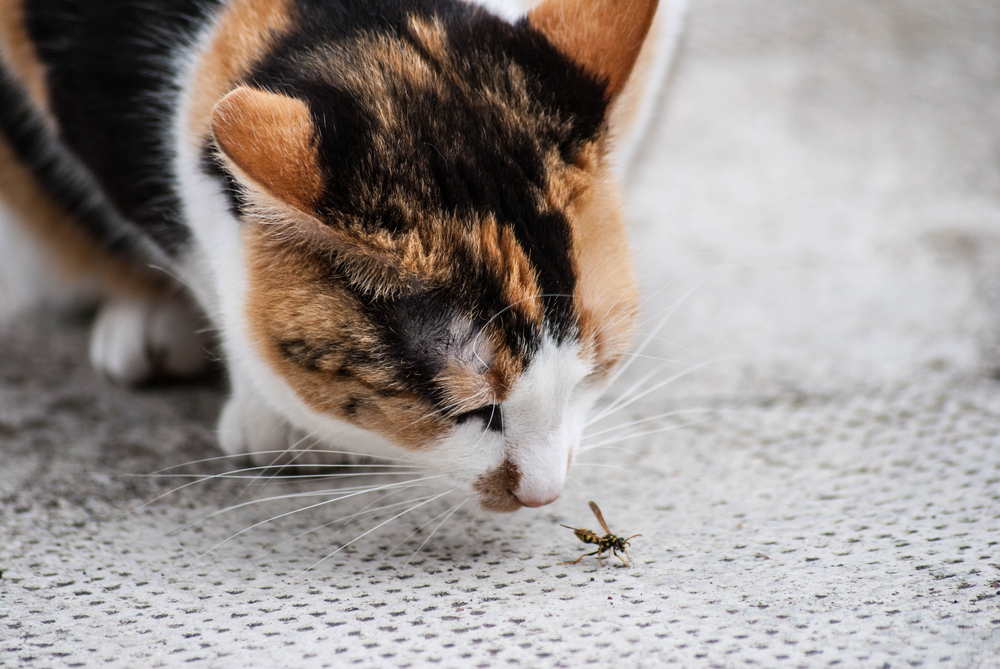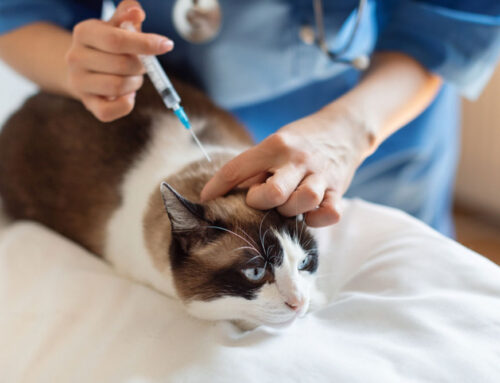Pets can have allergies to a wide range of substances, including pollen, food, and common household cleaners. When their immune system mounts an overactive response to a perceived threat, your pet can experience a health emergency. If your pet is suffering from an acute allergic reaction, knowing what to do can save their life. Our Oliver Animal Hospital team describes five steps to take when you suspect your pet is having an allergic reaction.
Step #1: Recognize allergic reaction signs in your pet
Pets’ allergic reactions can range from mild itching to severe, life-threatening anaphylaxis. Some reactions can begin mildly, but quickly escalate. To help ensure you get your pet the immediate veterinary care they need, learn to recognize allergic reaction signs:
- Itchiness (i.e., pruritus)
- Scratching, licking, chewing, or rubbing the affected body part
- Red, inflamed skin
- Hives
- Swollen paws
- Facial swelling
- Restlessness
- Lethargy
- Difficulty breathing
In general, facial swelling is the easiest sign to identify if your pet is having an acute allergic reaction. This situation can be dangerous for brachycephalic (i.e., flat-faced) pets, such as pugs, bulldogs, and Boston terriers, as facial swelling limits their breathing ability. Hives can be more difficult to spot in long-haired breeds, while restlessness can be a clue that your pet has a problem.
Severe acute allergic reactions manifest as anaphylaxis, causing vomiting, diarrhea, pale gums, collapse, and shock. These signs appear rapidly, and typically do not include hives or facial swelling. If your pet develops an anaphylactic reaction, seek emergency veterinary treatment.
Step #2: Remove the allergen from your pet and your environment
Remove the allergen from your pet and your environment. For example, if your pet encountered the business end of a bee, remove the stinger. Check your pet’s skin and fur, and survey your environment to determine their reaction’s potential cause, which may include:
- Bug bite or sting
- Venomous snake bite
- Food
- Household cleaners
- Air fresheners
- Medications
- Vaccines
Typically, environmental allergens, such as pollen, mold, and dust, produce an ongoing problem, rather than an acute reaction. However, any substance your pet comes in contact with has the potential to produce a severe reaction, so keep a sharp eye out when your furry pal ventures outside or you use a new cleaning product.
Step #3: Contact your veterinarian for advice
If your pet has an allergic reaction, you may be able to treat them at home. Contact your south Austin veterinarian to determine if at-home care is sufficient, or if you need to head to our Oliver Animal Hospital for treatment.
Pets who require in-hospital treatment for an allergic reaction typically receive antihistamine injections, such as diphenhydramine, and a corticosteroid, such as dexamethasone. These medications quickly halt a reaction’s inflammation, swelling, and itching. Some pets may require additional treatment, such as oxygen supplementation and epinephrine, and hospitalization may be necessary to support their recovery.
Step #4: Monitor your pet closely
If you tended to your pet’s allergic reaction at home, monitor them closely for worsening signs. Despite removing the allergen and administering appropriate medication, your pet’s condition can decline. Closely monitor their respiratory rate and effort, and keep an eye out for swelling and lethargy. If your pet is struggling to breathe, their muzzle is swelling, or their attitude and energy are declining, seek emergency veterinary treatment.
Step #5: Prevent future allergic reactions in your pet

Once your veterinarian has determined the allergen triggering your pet’s issues, you can minimize your furry pal’s exposure and reduce their severe reaction risk. For example, if your pet is allergic to bee stings, keep them away from areas bees frequent.
Pets who develop vaccine reactions may benefit from an altered vaccination schedule, or diphenhydramine or a similar medication before their appointment. If your furry pal has had issues with vaccinations in the past, inform our team of their reaction’s severity so we can take appropriate measures to keep them safe.
If your pet develops an allergic reaction, contact your south Austin vet immediately. Our Oliver Animal Hospital team can offer advice on what to do at home, or instruct you to bring in your pet for treatment.




Leave A Comment